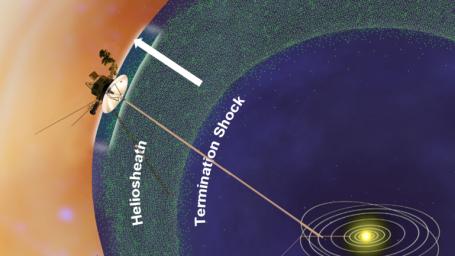
|
Low-Energy Particles Leaking out of the Solar System (Artist’s Concept)
- Click the image above for a larger view
- Full-Res JPEG (1280 x 720) (130.8 kB)
- Full-Res TIFF (1280 x 720) (2.8 MB)
Caption:
This artist's concept shows NASA's Voyager 1 spacecraft in a new region at the edge of our solar system where there are fewer low energy particles that originate from inside our solar system. Voyager 1 is in an area scientists are calling the stagnation region, at the outer layer of the heliosphere, or magnetic bubble that the sun blows around itself. Voyager 1 passed the termination shock in 2004 into the heliosheath, where the solar wind dramatically slows down and becomes turbulent. That area has the highest bombardment of higher energy particles from inside our solar system and their intensity held steady until mid-2010, when they sharply diminished to half the amount. The reduction indicates that these particles may be leaking to interstellar space and the spacecraft is nearing the space between stars.
Background Info:
The Voyager spacecraft were built by NASA's Jet Propulsion Laboratory in Pasadena, Calif., which continues to operate both. JPL is a division of the California Institute of Technology. The Voyager missions are a part of the NASA Heliophysics System Observatory, sponsored by the Heliophysics Division of the Science Mission Directorate in Washington. For more information about the Voyager spacecraft, visit http://www.nasa.gov/voyager .
Cataloging Keywords:
| Name | Value | Additional Values |
|---|---|---|
| Target | Heliosphere | |
| System | Solar System | |
| Target Type | Heliosphere | |
| Mission | Voyager | |
| Instrument Host | Voyager 1 | |
| Host Type | Flyby Spacecraft | |
| Instrument | ||
| Detector | ||
| Extra Keywords | Artwork, Color, Magnetosphere | |
| Acquisition Date | ||
| Release Date | 2011-12-16 | |
| Date in Caption | ||
| Image Credit | NASA/JPL-Caltech | |
| Source | photojournal.jpl.nasa.gov/catalog/PIA15176 | |
| Identifier | PIA15176 | |
